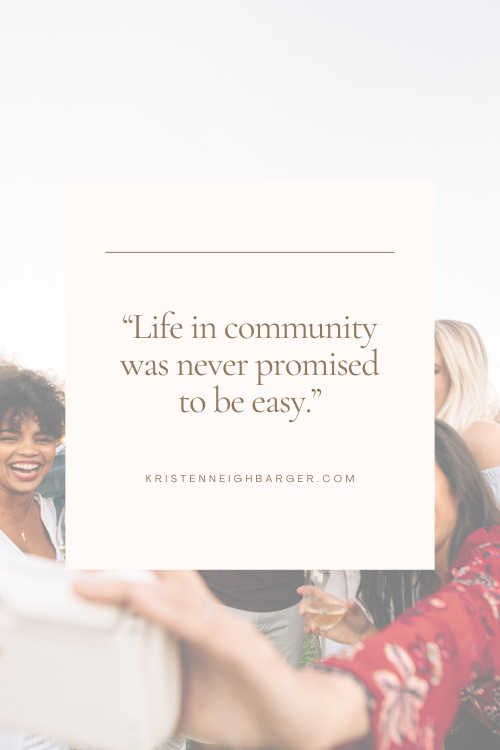
When Forgiveness Meets Repentance
Growing Up Without Boundaries
I learned a lot about relationships growing up without anyone ever saying they were teaching me about relationships.
I quickly became an expert at the subtle art of not communicating my feelings, bending over backwards to please people, and acquiescing to the whims of others…in the name of Jesus.
The ‘90s weren’t exactly overflowing with mental health awareness, healthy relationships, boundaries, or self-care. To even speak those words aloud in church back then was…oof. You’d be on the prayer lists for days.
Selflessness and service were the names of the game, and I was trained to play them well. Like many ‘80s and ‘90s kids who have since embraced therapy, boundaries, and healthy relationships, I do a lot of head-shaking and face-palming when I think back on the ideologies of my youth.
Forgiveness and Repentance in Luke 17
As the events of the last few weeks have unfolded, I’ve found myself, once again, taking a long hard look at some of those ideas.
I didn’t watch Charlie Kirk’s memorial service—I think that’s what we’re calling it. But I’ve seen the clip of his wife extending forgiveness to her husband’s murderer. While I’m not interested in a political debate with anyone other than my husband, I am interested in forgiveness and what Jesus had to say about it. Forgiveness is one of those foundational pillars of relationships I wish I’d learned more about in my early years.
Coincidentally, His thoughts on forgiveness are exactly where I am in my study of Luke.
“Betrayals are inevitable, but great devastation will come to the one guilty of betraying others. It would be better for him to have a heavy boulder tied around his neck and be hurled into the deepest sea than to face the punishment of betraying one of my dear ones! So be alert to your brother’s condition, and if you see him going the wrong direction, cry out and correct him. If there is true repentance on his part, forgive him. No matter how many times in one day your brother sins against you and says, ‘I’m sorry; I am changing; forgive me,’ you need to forgive him each and every time.” (Luke 17:1–4, TPT)
Imagining the Scene with the Disciples
I’m a storyteller, so I can’t help but create a scene in my head. Luke doesn’t tell us what prompted this teaching, but you and I both know most pastors don’t just pull lessons out of thin air.
I picture Peter pulling a prank on John. Jesus notices, sees the teachable moment, and instead of calling Peter out directly, He turns to everyone: “Let me tell you a story…”
So Jesus looks at these teenagers (because that’s what most of the disciples were) and explains: people are going to mess up. They’re going to make mistakes, betray each other, lead one another astray. And when they do? Don’t ignore it. Call it out.

Why Jesus Links Repentance and Forgiveness
Jesus doesn’t stop with calling out poor behavior. He goes further: if that brother repents, forgive him. Even if it happens over and over again in a single day.
That’s a hard word for people like me who grew up steeped in people-pleasing. We were taught to smile, ignore bad behavior, and call it “grace.” Jesus pushes us in another direction: truth-telling and forgiveness.
From People-Pleasing to Truth-Telling
I spent nearly two decades in a marriage where calling a spade a spade wasn’t an option without serious repercussions. Therapy and Jesus changed me. I vowed never to silence my voice again.
Now, in my marriage, if my husband’s being a jerk, I say so—and he does the same for me. That honesty doesn’t destroy our relationship. It strengthens it. Because it leaves room for both repentance and forgiveness.

Repentance AND Forgiveness: Two Sides of the Same Coin
Healthy relationships require both.
Repentance without forgiveness? That’s just shame.
Forgiveness without repentance? That’s cheap grace.
But repentance and forgiveness together? That’s the soil where real growth happens.
Jesus knew this. He was teaching his disciples not just how to get along, but how to build lasting community. He knew that conflict is inevitable, but restoration is possible when we pair repentance and forgiveness.
What This Means for Our Tables Today
When I think about the seats at my table, I want them filled with people who are willing to live this out — who can have the hard conversations that ultimately lead to growth, maturity, and connection.
As our tables get bigger, conflict is inevitable. People will think differently, misunderstand each other, and hurt feelings will happen. But Jesus gives us a model for how to walk through it. We just have to follow it.
Life in community was never promised to be easy, but maybe this week is your opportunity to take one small step. Speak the truth in love. Forgive when repentance comes. And keep building a table where honesty, grace, and healthy relationships can flourish.
Reflection Questions
Where have you stayed silent instead of speaking the truth in love?
Is there someone you need to forgive because they’ve genuinely repented?
What step could you take this week to model both repentance and forgiveness in your closest relationships?
